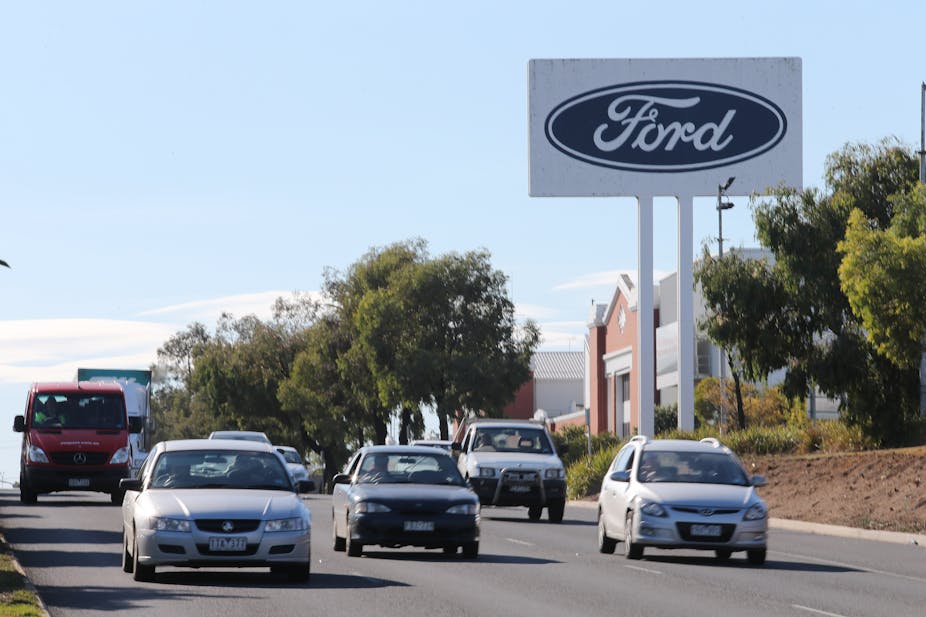The closure of Ford’s casting plant in Geelong does make you wonder how losing the ability to make our own engines can be a step forward. Australia should take stock and contemplate what kind of society we are becoming.
Critics of the decision to allow the car industry to leave would argue that governments should subsidise their local car manufacturing industries because of the benefits the industry brings in terms of employment and raising the general technological level of that country.
In An Economy is not a Society, Dennis Glover argues that we are making a tremendous social and economic mistake in allowing such industries to close in the name of global competition. Glover outlines how the support for manufacturing in the post second world war era provided a base for many ordinary people to lead better lives, leading to many positive social and economic outcomes. He argues that the type of economy we have developed since the 1980s favours a few over the many.
Certainly, the current government has shown more enthusiasm for making submarines than it did for car manufacturing, how does that extraordinary $50 billion dollar investment stack up, in terms of jobs and flow on effects?
With the closing of the automotive industry, our knowledge of metals casting will clearly dive. Those employed at Ford and similar employees at Toyota and Holden don’t have equivalent jobs to take their deep knowledge to.
The opportunities in the metals industry in this country are thin on the ground. The large casting plants are now in Asia, though the high technology end still prospers in part of Western and Northern Europe. The Chinese are currently known more for the low value end of metal castings but they are likely to follow the Koreans and Japanese into the high value end as their economy develops.
Recently, I took a group of engineering students to visit the Ford casting plant. After donning high visibility orange vests, we were given a tour of the plant by an amicable Ford engineer.
He showed us the various details of how engine moulds were formed, steel scrap melted, alloy elements added and engine blocks cast. It was clear that a lot of expertise had been developed over the decades to ensure that tight quality requirements were met.
I was also interested to see how much technology had been developed to recycle the sand used in the moulds and our tour guide joked that he had spent as much time cleaning sand as did making engines.
Casting is one of those technologies that it is so successful, we barely notice it. We take it for granted that millions of objects can be cast each year with excellent physical properties and durability. New technologies such as 3D printing can out do the same in terms of versatility and detail but currently lag far behind casting in terms of quality, cost and productivity.
The materials science that underpins this technological triumph was mainly developed in the post second world war era, when new techniques in microscopy and analysis allowed us how to control the structure of cast materials with greater precision. New developments in casting and thermo-mechanical processing (post treatment of the cast structure) continue, as the push for even higher quality and better properties drives research and investment in new technology.
Our safe arrival at work each day, whether we travel by car, rail or plane, relies on this knowledge.
Our tour guide said that our group was probably the last tour through the plant before it is closed and the site is bulldozed. As he tried to make light of the situation, the good humoured banter between the engineer and the students evaporated and we all stood stone faced outside the plant feeling like something worthwhile was about to disappear.
The plant isn’t closing down because casting technology is no longer important but because our car industry has become uncompetitive in a global market and our government is no longer willing to prop it up on the promise that it will one day become more competitive.
At a more immediate personal level, we have all got use to the idea of buying cheap cars produced in Asia. The thought of returning to the era of our parents, where there was limited choice and the local made cars were protected by tariffs and government policy, has little appeal.
We may want to blame the government for the end of the car industry in this country but there are literally millions of individual choices underneath that decision. Simply put, most of us prefer a cheap Korean or Japanese car over a locally made equivalent from Broadmeadows, Altona, Geelong or Elizabeth.
Perhaps, the loss of skills in casting will be offset by jobs in new industries. Certainly, opportunities for skilled jobs in 3D printing, carbon fibre composites, biomedical equipment and automation are likely to emerge over the next decade.
Australia has a number of impressive technology based companies who specialise in the high precision machining, and the Boeing works in Melbourne, where carbon fibre technology developed in Australia has been successfully applied.
Perhaps, new casting industries will also emerge in Australia. The A W Bell company in Dandenong South has recently prospered by combining traditional casting with new digital based technologylink text. It must be said, that these are all relatively minor successes compared to the closure of an entire major industry.
There is a real danger that an important skill base will disappear from our country, as the furnaces are turned off for the last time in Geelong.

